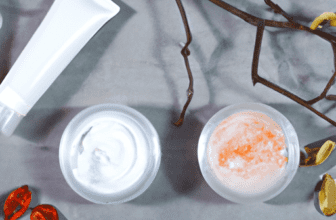Sun Protection in Skincare Routines: Shielding Your Skin from Harmful Rays
“Embrace the Sun, Not the Damage: Your Skin’s Best Defense Against Harmful Rays.”
sun protection in Skincare Routines: Shielding Your Skin from Harmful Rays is a comprehensive guide that emphasizes the importance of incorporating sun protection into daily skincare regimens. It provides an in-depth understanding of the damaging effects of the sun’s ultraviolet (UV) rays on the skin, leading to premature aging, sunburn, and increased risk of skin cancer. The guide offers practical advice on various sun protection methods, including the use of sunscreens, protective clothing, and lifestyle adjustments. It aims to educate readers on how to effectively shield their skin from harmful rays, promoting skin health and preventing sun-related skin conditions.
Maximizing Sun Protection: Incorporating SPF Skincare into Your Routine
sun protection is an essential aspect of skincare that is often overlooked. The harmful ultraviolet (UV) rays from the sun can cause a myriad of skin issues, ranging from premature aging to skin cancer. Therefore, incorporating sun protection factor (SPF) skincare into your routine is not just a matter of maintaining youthful, radiant skin, but also a crucial step in safeguarding your health.
The first step in maximizing sun protection is understanding the importance of SPF. SPF, or sun protection Factor, is a measure of how well a sunscreen can protect your skin from UVB rays, the kind of radiation that causes sunburn and contributes to skin cancer. SPF 15, for instance, can block about 93% of UVB radiation, while SPF 30 can block 97%, and SPF 50 can block 98%. However, no sunscreen can block 100% of UVB rays, which is why it’s essential to reapply sunscreen every two hours and after swimming or sweating.
Incorporating SPF skincare into your routine doesn’t have to be a daunting task. Many daily moisturizers now come with SPF, providing hydration and sun protection in one easy step. These products are typically light enough to be worn under makeup, making them a convenient choice for daily use. For those with oily or acne-prone skin, oil-free and non-comedogenic options are available, which won’t clog pores or cause breakouts.
In addition to daily moisturizers, there are also SPF-infused foundations and powders on the market. These products offer an extra layer of protection and are perfect for those days when you’ll be spending more time outdoors. However, they should not replace your regular sunscreen, as the amount of SPF in makeup is usually not enough to provide adequate protection on its own.
While SPF skincare products are a great start, they should be complemented with other sun protection measures for maximum effectiveness. Wearing protective clothing, such as wide-brimmed hats and long-sleeved shirts, can provide physical barriers against the sun’s rays. Additionally, seeking shade during peak sun hours, typically between 10 a.m. and 4 p.m., can significantly reduce your exposure to harmful UV radiation.
It’s also important to note that sun protection is necessary all year round, not just during the summer months. UV rays can penetrate clouds and reflect off snow, meaning you can still get sunburned on cloudy or snowy days. Therefore, incorporating SPF skincare into your routine should be a daily habit, regardless of the season or weather.
Lastly, remember that sun protection is not just about preventing sunburn. Chronic exposure to the sun’s harmful rays can lead to premature aging, characterized by wrinkles, fine lines, and age spots. More seriously, it can also increase your risk of developing skin cancer, the most common form of cancer in the United States. By incorporating SPF skincare into your routine, you’re not just preserving your skin’s youthful appearance, but also protecting your overall health.
In conclusion, maximizing sun protection involves more than just slathering on sunscreen during beach trips. It requires a comprehensive approach that includes incorporating SPF skincare into your daily routine, wearing protective clothing, and practicing sun-safe behaviors. By taking these steps, you can shield your skin from harmful rays, maintain its youthful glow, and most importantly, safeguard your health.
The Importance of UV Protection in Your Daily Skincare Regimen

sun protection in skincare routines is a topic that cannot be overstated in its importance. The harmful rays of the sun, specifically ultraviolet (UV) rays, pose a significant threat to the health and appearance of our skin. Incorporating UV protection into your daily skincare regimen is not just a matter of maintaining youthful, radiant skin, but also a crucial step in preventing skin cancer.
UV rays are a form of radiation emitted by the sun. They are categorized into three types: UVA, UVB, and UVC. UVC rays are the most dangerous, but fortunately, they are absorbed by the earth’s atmosphere and do not reach our skin. However, UVA and UVB rays do penetrate the atmosphere and can cause significant damage to our skin. UVA rays, which account for up to 95% of the UV radiation reaching the earth’s surface, are less intense than UVB rays but are more prevalent and can penetrate the skin more deeply. They are primarily responsible for premature skin aging and wrinkling. UVB rays, on the other hand, are the main cause of skin reddening and sunburn and play a key role in the development of skin cancer.
The first line of defense against these harmful rays is sunscreen. Sunscreen works by absorbing, reflecting, or scattering the sun’s rays on the skin. It is measured in terms of sun protection factor (SPF), which indicates how well it protects against UVB rays. Dermatologists recommend using a sunscreen with an SPF of at least 30, which blocks 97% of UVB rays. However, no sunscreen can block 100% of UV rays, and it does not stay effective for more than two hours without reapplication. Therefore, it is essential to reapply sunscreen every two hours and immediately after swimming or excessive sweating.
In addition to sunscreen, there are other ways to incorporate UV protection into your skincare routine. Many skincare products, such as moisturizers and foundations, now come with built-in SPF. While these products provide some protection, they should not replace sunscreen but rather be used in conjunction with it. Wearing protective clothing, such as wide-brimmed hats and long-sleeved shirts, and seeking shade during peak sun hours (10 a.m. to 4 p.m.) can also help protect your skin from UV damage.
Moreover, it is important to note that sun protection is necessary all year round, not just during the summer. UV rays can penetrate clouds and reflect off surfaces like water, snow, and sand, increasing your exposure. Even indoor lighting and screens can emit low levels of UV radiation. Therefore, incorporating UV protection into your daily skincare routine is essential regardless of the season or your indoor/outdoor activities.
In conclusion, the importance of UV protection in your daily skincare regimen cannot be overstated. It is not just about maintaining youthful, radiant skin, but also about preventing skin cancer. By incorporating sunscreen and other UV-protective measures into your daily routine, you can shield your skin from the harmful rays of the sun and maintain its health and vitality for years to come.
Sunscreen in Skincare: The Ultimate Shield Against Harmful Rays
sun protection in skincare routines is an essential aspect of maintaining healthy skin. It is a topic that has gained significant attention in recent years, as more and more people are becoming aware of the harmful effects of the sun’s ultraviolet (UV) rays. The sun emits two types of harmful rays: UVA and UVB. UVA rays penetrate deep into the skin and are primarily responsible for premature aging, while UVB rays burn the skin’s surface and are the main cause of sunburn. Both types of rays can cause skin cancer, making sun protection a critical component of any skincare routine.
One of the most effective ways to shield your skin from these harmful rays is by incorporating sunscreen into your daily skincare routine. Sunscreen, also known as sunblock, is a product that combines several ingredients that help prevent the sun’s UV radiation from reaching the skin. It works by absorbing, reflecting, or scattering sunlight, thereby protecting the skin from damage.
Sunscreen comes in various forms, including lotions, gels, sprays, and sticks. Regardless of the form, it is crucial to apply it generously and evenly on all exposed skin. It is recommended to use a sunscreen with a sun protection Factor (SPF) of at least 30, which blocks 97% of the sun’s UVB rays. However, no sunscreen can block 100% of the sun’s rays, so it is also important to seek shade and wear protective clothing when the sun’s rays are the strongest, typically between 10 a.m. and 4 p.m.
While sunscreen is a powerful tool in the fight against skin damage, it is not a one-and-done solution. It needs to be reapplied every two hours, or immediately after swimming or sweating, to maintain its effectiveness. Moreover, sunscreen should be used on cloudy days as well, as up to 80% of the sun’s harmful UV rays can penetrate your skin even on cloudy days.
In addition to regular sunscreen use, other skincare products with built-in sun protection can also be incorporated into your routine. Many moisturizers, foundations, and lip balms now come with SPF, providing an extra layer of protection. However, these should not replace sunscreen but rather be used in conjunction with it for maximum protection.
It is also worth noting that while sun protection is important for everyone, individuals with fair skin, those who burn easily, and those with a family history of skin cancer are at a higher risk and should be particularly diligent about sun protection.
In conclusion, sun protection is a vital part of skincare. By incorporating sunscreen into your daily routine and taking other protective measures, you can shield your skin from the harmful effects of the sun’s rays. Remember, prevention is always better than cure, and in the case of sun damage, this adage holds particularly true. So, make sunscreen your skin’s best friend and enjoy the sunshine responsibly.
Understanding the Role of Sun Protection in Preventing Skin Damage
sun protection plays a pivotal role in skincare routines, serving as a shield against the harmful rays of the sun. The sun emits ultraviolet (UV) radiation, which can cause a myriad of skin problems, including premature aging, sunburn, and even skin cancer. Therefore, incorporating sun protection into your skincare routine is not just about maintaining a youthful appearance, but also about safeguarding your health.
The sun emits two types of harmful rays: UVA and UVB. UVA rays penetrate deep into the skin, causing long-term damage such as wrinkles and age spots. On the other hand, UVB rays are primarily responsible for sunburn and play a key role in the development of skin cancer. Both types of rays are harmful and can damage your skin, even on cloudy days or during winter. Hence, it is crucial to protect your skin from these harmful rays all year round.
Sunscreen is the most common form of sun protection. It works by either absorbing the UV rays to prevent them from penetrating the skin or reflecting them away from the skin. Sunscreens are rated by their sun protection Factor (SPF), which indicates how well they protect against UVB rays. For instance, an SPF 30 sunscreen blocks about 97% of UVB rays, while an SPF 50 sunscreen blocks about 98%. However, no sunscreen can block 100% of UV rays, which is why it is essential to reapply it every two hours and after swimming or sweating.
While sunscreen is a vital component of sun protection, it should not be your only line of defense. Other measures such as wearing protective clothing, seeking shade, and avoiding the sun during peak hours (10 a.m. to 4 p.m.) can significantly reduce your exposure to harmful UV rays. Moreover, wearing sunglasses can protect your eyes from UV radiation, which can lead to cataracts and other eye problems.
In addition to these measures, it is also important to be aware of the UV Index, a measure of the strength of sunburn-producing UV radiation at a particular place and time. The higher the UV Index, the greater the potential for damage to the skin and eyes, and the less time it takes for harm to occur. Therefore, checking the UV Index can help you plan your outdoor activities and protect your skin accordingly.
In conclusion, sun protection is an integral part of skincare routines. It involves not only the use of sunscreen but also adopting other protective measures such as wearing protective clothing and avoiding the sun during peak hours. By understanding the harmful effects of UV radiation and taking appropriate steps to protect your skin, you can maintain a youthful appearance and reduce your risk of skin damage and skin cancer. Remember, sun protection is not just about looking good; it’s about staying healthy.
Q&A
1. Question: Why is sun protection important in skincare routines?
Answer: sun protection is crucial in skincare routines because it helps prevent skin damage caused by harmful ultraviolet (UV) rays from the sun. This includes premature aging, sunburn, and skin cancer.
2. Question: What types of sun protection products are available for skincare?
Answer: There are various types of sun protection products available for skincare, including sunscreens with different SPF levels, sunblock, moisturizers with SPF, lip balms with SPF, and makeup products with sun protection.
3. Question: How often should sun protection be applied?
Answer: sun protection should be applied every day, even on cloudy days, as UV rays can penetrate through clouds. It should be reapplied every two hours, or immediately after swimming or sweating.
4. Question: What is the difference between UVA and UVB rays?
Answer: UVA rays penetrate deep into the skin and are primarily responsible for premature aging and skin cancer. UVB rays, on the other hand, can burn the superficial layers of the skin and also contribute to skin cancer. Both types of rays are harmful and protection against them is necessary.In conclusion, incorporating sun protection into skincare routines is crucial for shielding skin from harmful rays. Regular use of sunscreens, wearing protective clothing, and limiting sun exposure, especially during peak hours, can significantly reduce the risk of skin damage, premature aging, and skin cancer. Therefore, sun protection should be an essential part of daily skincare routines for maintaining healthy skin.





